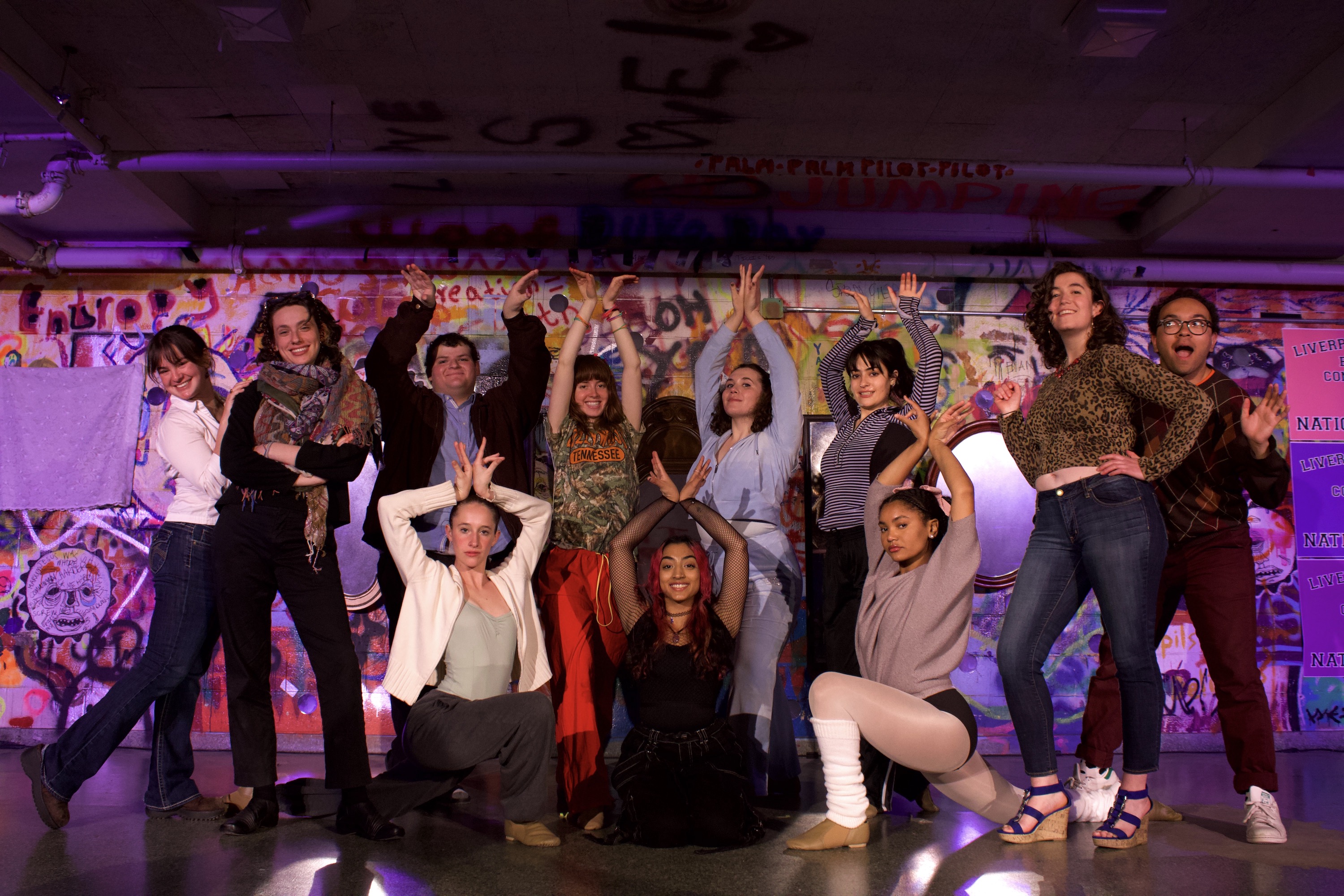
c/o Ruby Clarke
Taking the relatable trope of tweenage drama and turning it inside out, “Dance Nation,” directed by Hadassa Garfein ’24 and Vincent Langan ’24, explores what happens when a hobby becomes your whole life.
Many of us have been there, especially those who belonged to dance teams and found that competition, which begins as fun, quickly becomes cutthroat and suddenly the pressure to win consumes even the joy of dancing itself. The show, performed on Friday, April 28 at 8:00 p.m. and Saturday, April 29 at 2:30 p.m. and 8:00 p.m. in the WestCo Café, follows a dance team of 12- and 13-year olds striving to advance to a prestigious competition in Tampa. These dancers navigate parental pressure, changing bodies, stolen dance solos, and a dance teacher (played by Miranda Simon ’24) whose intensity can only be described as next level.
“I want them to be horrified, and I want them to laugh their buttocks off, and then cry and feel like they’ve been undone and re-stitched up, all in 90 minutes,” Langan said on what he hoped the play would do for its audience.
The show is funny on the surface but deeply thought-provoking and heart-wrenching between the many laughs. Each character gives a poignant monologue which reveals the depths of their insecurities and the extent of their worries. Everyone’s under pressure and everyone cracks in some way throughout the performance—due to high expectations from well-meaning but overbearing parents, bodily insecurities like getting your period for the first time and having blood leak through your clothes, or falling during your first solo routine at a competition and your best friend stealing the show—as happens to Zuzu (played by Caroline Seymour ’24), who is devastated when Amina (played by CJ Joseph ’25) steps into the spotlight in her stead.
“What I really love about this show, and also something I think that Vinny and I are just drawn to in general as we work together, are these unexplored territories of girlhood and what it means to transition from being a child into an adult,” Garfein said. “We find that to be really poignant because that’s kind of the state of what it is like to be in college.”
Langan and Garfein first collaborated last spring with “Horse Girls,” which explored similar themes. But “Dance Nation” strives less for laughs and more for commentary on the difficulties of growing up.
“For us, being 11, 12, 13 is ten years ago maybe, but the memories and the wounds are still very fresh, so we’re able to explore that while still treating these characters like they’re adults, and we’re really able to sit down and listen to [them]—it’s a really, really different thing than [what] you see from a lot of depictions of teenage girls especially,” Langan said.
So while part of you wants to hate Amina when she steals her best friend’s solo, another part of you feels for this girl who has to accept that she has more natural talent than her teammates and that this will, inevitably, leave her both at the top and also utterly alone. Indeed, the show’s final scene concludes with Amina sobbing at this realization as the lights fade to black. “Dance Nation” grapples with what someone is willing to sacrifice for the sake of dance itself. For Amina, it seems less of a choice than a destiny, a passion amplified to embody the curse of loneliness.
This emotionally-charged commentary provides a sobering contrast to the moment preceding it where you realize that the coffee the girls have been drinking as they swear their loyalty to each other is actually period blood, cementing the idea that being a teenage girl may often feel like belonging to a cult and is only understandable if you’re on the inside.
In a way, this moment showcases both what is terribly wrong and terribly inspiring about the show.
“I think one of my favorite things about the play is how it explores self-confidence, and almost turns notions of self-confidence on its head,” Garfein explained. “So often, young girls are taught that they can’t be confident, and the world is bogging them down. There’s so many moments in the show where the characters just take that and run with it. Instead of saying, ‘Screw the world, I’m going to be self confident!’ they just do it, and they completely obstruct any notion of undermining themselves, which I don’t think is something that we really see in pop culture, [and] which I just find to be so beautiful about the show.”
Langan expressed that the show also focuses on trying to find your voice at a time where you may not necessarily know who you are.
“I think the characters are really rich, and each…has their own really distinct feature about themselves,” Langan said. “But it feels like this is just who they are at this point in their lives—they feel like they can transform into these totally different people at some point. I think it’s a play about when you’re young and like you’re planting the seeds for your life. The vine can grow in so many directions.”
Each character, from Dance Teacher Pat, to Zuzu and Amina, feels thorough, whole, like they’re deserving of our time and, more importantly, of our empathy. Even when Maeve (played by Alix Livermore ’24) confesses to flying—which feels more like a euphemism for tripping on drugs than anything else—or when Sofia (played by Eliza Bender ’24) offers her coffee cup to her friends without telling them about its bloody contents, each character could be a real person you’d meet on the street—or in a dance studio.
Tweenage life is just crazy enough to be believable, and “Dance Nation” brings it all to the forefront for us to laugh, cry, cringe, shriek, and simply ponder.
Rachel Wachman can be reached at rwachman@wesleyan.edu.
Comments are closed